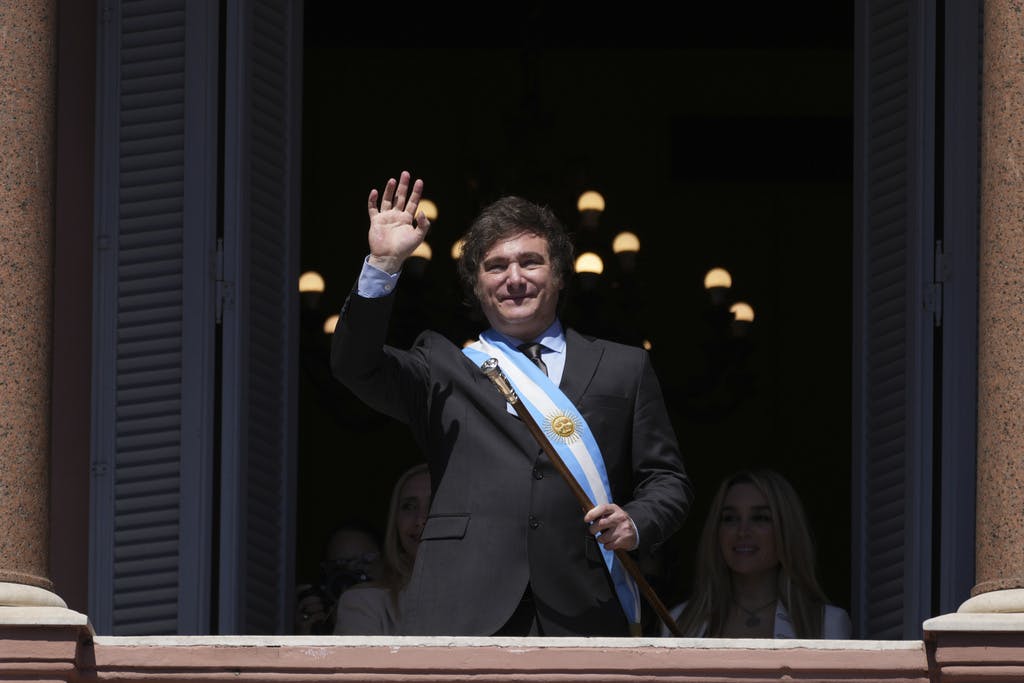The Miracle of Milei: Argentina Could Spark a Passionate Embrace of Individual Liberty — and Prosperity
Argentina’s new president turns up just as America seems to be losing confidence in the virtues of its founding values and democratic capitalism.

Sometimes a political miracle comes along. The election of Javier Milei as Argentina’s new president may turn out to be an enchanting, but ultimately disheartening, event in the ongoing history of our Western Hemisphere neighbor. Or it may be the spark that touches off a passionate embrace of individual liberty and free enterprise that is nothing short of revolutionary.
Just as America seems to be losing confidence in the virtues of its founding values and democratic capitalism, giving up on ever reining in federal spending or limiting the scope of government, Mr. Milei arrives to say that we must keep fighting. “The enemy is socialism,” he boldly proclaims. “The enemy is statism, the enemy is collectivism.”
Don’t let politicians expand the state, Mr. Milei warns, lamenting that Argentina, once among the world’s richest nations, has been rendered miserable by redistributionist policies. It’s a powerful message at a compelling moment — all the more intriguing because it comes from a trained economist whose policy initiatives are aligned with his libertarian political philosophy.
Mr. Milei readily invokes the great thinkers from the Austrian school of economics, Friedrich Hayek and Ludwig von Mises, to affirm that sound finances and sound money are the requisite pillars for a free society dedicated to opportunity and prosperity. Government spending in the name of social justice is a form of theft, according to Mr. Milei.
The new president has signaled a radical approach. He has introduced legislation to prohibit usage of the word “free” to describe benefits or services provided by government — insisting it must be clarified that taxpayers are the ones footing the bill. He pledges to send to jail any central bank official who issues money to finance government budget deficits.
Can such a radicality to restoring fiscal responsibility and monetary integrity reverse the trend toward ever-larger government? In January, the first full month since Mr. Milei took office, Argentina achieved its first monthly budget surplus in nearly 12 years. Federal spending was reduced 39.4 percent by slashing government subsidies, freezing public works, and reducing public employees.
How does Argentina’s president justify such measures? “No hay plata,”* Mr. Milei explains. Certainly there is no domestically-issued money in Argentina that hasn’t been hopelessly corrupted as a standard of value through the erosion of its purchasing power. Decades of printing money to cover government deficit spending has resulted in a 254 percent annual inflation rate.
Mr. Milei’s pledge to discard the peso and replace it with the American dollar was a centerpiece of his presidential campaign, although early plans to make the switch now appear to have stalled. Here is where America should be paying close attention. The significance of Argentina’s new commitment to enriching society through limited government and the free market system goes beyond merely providing ideological reaffirmation for its demoralized neighbor to the North.
The decision to dollarize by Argentina — Latin America’s second-largest country and third-largest economy — has important geopolitical implications that should not be met with indifference. It’s no secret that stepped-up economic sanctions have fostered bristling resentment of American monetary hegemony around the world.
Communist China has been actively working with other nations — not all of them rivals — to discourage usage of the greenback in global transactions. As the major political and economic force behind the Brics countries —Brazil, Russia, India, China, and South Africa — China seeks to provide a counterweight to the Western-led world by promoting trade in its own currency, the yuan.
At a regional meeting in August, the Brics group formally invited Argentina to join them. The president of Argentina at the time, Alberto Fernandez, pronounced it a “great opportunity” that would open up a “new scenario” for Argentina. He was fully on board to accept. In October, Argentina’s central bank tapped a currency swap line with China’s central bank to pay down its debt to the International Monetary Fund by using yuan — which the IMF approved.
Argentina was slated to be admitted to the Brics on January 1, along with five other new members: Egypt, Iran, Ethiopia, Saudi Arabia, and the United Arab Emirates. Yet Mr. Milei, who openly seeks greater alignment with the “free nations of the West,” especially America and Israel, announced on December 29 that Argentina was officially withdrawing from its planned entry into Brics.
This no doubt caused consternation in certain capitals — not the least important reason being that Argentina has major reserves of lithium. China’s foreign ministry warned Argentina that severing ties would be a “serious mistake.” Russia called the decision “regrettable” and hoped Buenos Aires would reconsider.
None of which means that America should feel smug about Mr. Milei’s preference for alliances based on shared values — freedom, democracy, private enterprise. Nor should we take for granted his enthusiasm for dollarization. “All central banks are a scam,” he stated in an interview last September, calling the Federal Reserve “the lesser evil” in comparison with his own nation’s central bank.
Mr. Milei has much to teach America — and other market democracies. The imperative of putting our own fiscal house in order has never been clearer. We need to make the American dollar worthy of being the most trusted currency in the world. And remember that miracles do happen.
________
* “There’s no money.”

